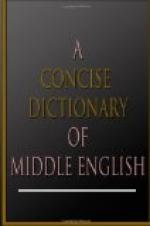Dunt, sb. blow, S, S2; see Dent.
Effnenn, v. to make equal or even, S; see Euenen.
Ernes. A derivation of this word from the French has not been proved.—OF. ernes does not exist.
Falten. The form falt should be taken away from this article and placed under Folden. The words falt mi tunge mean ’my tongue gives way.’ For the various meanings of this verb folden, see MD (ii. 68). This correction is due to the kindness of Prof. Napier.
For-swinken, v. to exhaust with toil; forswonke, pp., S3 (p. 364, l. 24).
Frayd, pp. frightened, S3; fraid, scared, S3; see Afrayen.
Habide, v. to abide, resist, S2; see A-biden.
Hagt. Dr. F. Holthausen suggests that this word means ’danger, peril,’ comparing this ME hagt with Icel. hA|tta which has the same meaning. Kluge connects this hA|tta with Gothic ha*han, to hang, so that it may mean radically ‘a state of being in suspense.’ The word must have come into England in the form *_haht_, before the assimilation of ht to tt.
Hal, adj. all, S2; see Al.
Ham, 1 pr. s. am; S; see Am.
Haxede, pt. s. asked, S; see Asken.
Here, adv. before, S; see Er.
Heremyte, sb. hermit, S2; heremites, pl., P; see Ermite.
Hulpen. (To be placed more to the right.)
Ich, adj. each, S, S2; see Eche.
Ieden, pt. pl. went, S; see Eode.
Joutes. For juta* read ju*ta. For other cognates of this wide-spread word, see Kluge (s.v. jauche). See also s.v. kAse, where Kluge remarks that Icel. ostr, cheese, and Finnish juusto, cheese, are etymologically connected with G. jauche, and Latin jus.
Kepen. AS. cA(C)pan, to keep, should be kept quite distinct from AS. cA1/2pan, to sell. AS. cA1/2pan is the phonetic representative of OTeut. kaupjan, whereas cA(C)pan, to keep, represents an OTeut. ko*pjan_. Cp. E. _keen_, the representative of AS. _cA(C)ne_, OTeut. _*ko*ni_ (G. _kA1/4hn_). See Kluge’s note in P. & B. BeitrAge, viii. 538.
Mo. Add ) at the end.
Note, sb. nut. A better explanation of not-heed is ’with the hair of the head closely cut.’ The verb to nott means to cut the hair close. ‘Tondre, to sheer, clip, cut, powle, nott’; Cotgrave.
Onond, prep. as regards, respecting, S; onont, S; see An-ent.
Quene. It should be noted that E. queen is not precisely the same word as E. quean. For queen is the phonetic equivalent of AS. cwA(C)n, Goth, kwe*ns, whereas quean represents AS. cwe*ne, Goth. kwi*no.




